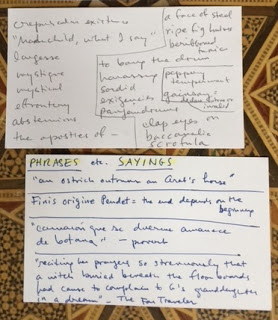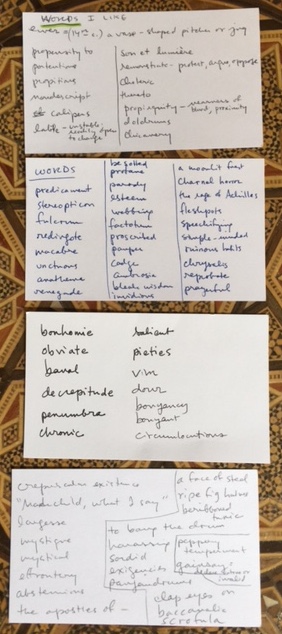

I will be giving my annual one day only workshop on Literary Travel Memoir at the Writer’s Center in Bethesda, Maryland this April 22. New in ye olde packet of handouts for this workshop is “Words I Like,” my name for a powerful yet simple practice that you might think of as Feldenkrais for your vocabulary.
“WORDS I LIKE”
As writers, albeit human creatures of habit, we tend to use only a woefully limited portion of our vocabularies. Hence our first drafts may be stiff, dull, and vague. To add verve, freshness, and focus, it helps to loosen up our mental joints, as it were, and reach for a greater variety of words.
The challenge is not necessarily to expand your vocabulary –I am not talking about trying to sound fancy– though perhaps you or one of your characters may want to do that– but to bring more of your writerly attention to words you know but do not normally use.
Towards that end reading is vital– but not reading passively, as a consumer of entertainment, nor reading for facts and concepts, as would a scholar. Instead, read as a writer, with a pencil or pen in hand, noting down any words that strike you as especially apt or somehow, for whatever reason, attractive to you.
These might be simple words such as, say, brood; caprice; crackpot; pall; nougat; persimmon.

When I read I keep a notebook, PostIt, or index card handy so I can jot down any words and phrases that I like. I used to worry about keeping all these notebooks and bits of paper in some semblance of order, but I now believe that most of the benefit is in simply noticing what it is that I like; and second, writing it down. (In other words, when it comes time to declutter, I will, as I have, and so what?) Of late I toss these index cards in a recipe box that I keep on a shelf behind my desk. When one of my drafts needs an infusion of energy, I pluck out a random batch of cards, shuffle though them, and see if anything might be of use. Often it is.
From another card plucked out at random:
shrewd
sagacious
“intrigue and shifting loyalties”
surmise
astute
console
relentless
do not relent
never relent;
pout
nuanced
verdict
deadly
banal
banalities
dejected
munificence
fail to grasp
thieving toad
Thieving toad! I don’t know why, that makes me laugh. And it makes me want to start (or perhaps end?) a short story thus:
She failed to grasp that he would never relent, he was a thieving toad.
I also note phrases and sayings I like, e.g.:
“Trust in Allah, but tie your camel.”
“Birds of prey don’t sing”
“the apostles of — ”
“camarón que se duerme amanece de botana” (the shrimp that sleeps wakes up as an appetizer– that’s a variation on the old Mexican saying, “the shrimp that sleeps is carried off by the current.”)

From that second index card pictured above:
bonhomie
obviate
banal
decrepitude
penumbra
chronic
salient
pieties
vim
dour
bouyancy
bouyant
circumlocutions
Why these words? Because I like them. You might not. The point is, as you read, write down whatever words you like.
Well now, I hear Henry James’ Muse yelling!
So many salient pieties… In the penumbra of his chronic bonhomie, she felt at once dour and bouyant.
>> Workshop Page
>> Resources for Writers
(Includes Tips & Tools; On Craft; On Editing; On Publishing; On Digital Media & more)
>> Giant Golden Buddha & 364 More Free 5 Minute Writing Exercises

From The Writer’s Carousel: Literary Travel Writing
Find out more about C.M. Mayo’s books, shorter works, podcasts, and more at www.cmmayo.com.

